Muslim Wedding rituals
Marriage in Islam is known as a spiritual obligation, a contract between the couple and Allah. Whether you're planning a Muslim wedding or attending your first Muslim wedding, it is vital to know historic and cultural Muslim wedding traditions. Islam is one among the prominent religions within the world. Wedding is an integral part of Islamic culture and is mandated by the Holy book of Islam named quaran as one of the primary duties of a Muslim. Muslim Wedding traditions vary greatly supported countries and regions, but at its heart, the ‘Nikah’ ceremony remains an equivalent . Let’s take a glance at the varied rituals of a Muslim Wedding.Marriage in Islam is known as a spiritual obligation, a contract between the couple and Allah. Whether you're planning a Muslim wedding or attending your first Muslim wedding, it is vital to know historic and cultural Muslim wedding traditions. Islam is one among the prominent religions within the world. Wedding is an integral part of Islamic culture and is mandated by the Holy book of Islam named quaran as one of the primary duties of a Muslim. Muslim Wedding traditions vary greatly supported countries and regions, but at its heart, the ‘Nikah’ ceremony remains an equivalent . Let’s take a glance at the varied rituals of a Muslim Wedding.Marriage in Islam is known as a spiritual obligation, a contract between the couple and Allah. Whether you're planning a Muslim wedding or attending your first Muslim wedding, it is vital to know historic and cultural Muslim wedding traditions. Islam is one among the prominent religions within the world. Wedding is an integral part of Islamic culture and is mandated by the Holy book of Islam named quaran as one of the primary duties of a Muslim. Muslim Wedding traditions vary greatly supported countries and regions, but at its heart, the ‘Nikah’ ceremony remains an equivalent . Let’s take a glance at the varied rituals of a Muslim Wedding.
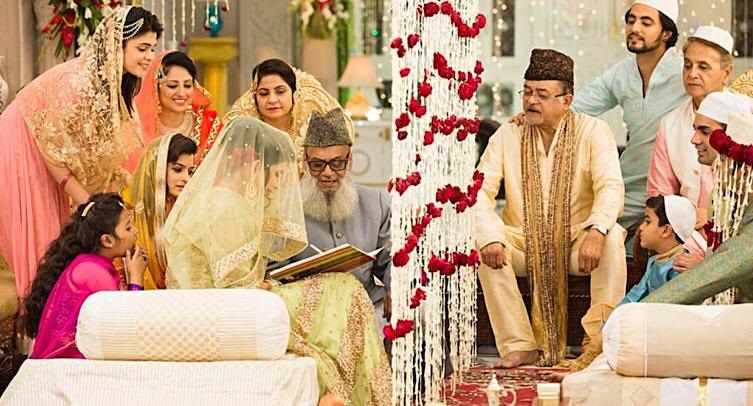
There are pre-marriage rituals, marriage rituals, and post-marriage rituals at every wedding. Indian weddings are always elaborate. Here are the rituals that Islamic weddings follow.
Pre-Wedding Rituals
Ishtikhara
This is the foremost important ritual during a Nikah. The religious heads of the Muslim community come together to pray to Allah and is an official announcement of the marriage.
Imam-Zamin
In this ritual, the groom’s mother visits the bride’s home. She brings gifts and sweets and is wrapped in a silk scarf and she ties around the wrist of the bride, marking her welcome to the family.
Mangni
Mangni is an engagement where relatives come together to witness the ring ceremony. Both families shower each other with gifts. This is the public declaration of the wedding of the bride and groom.
Manjha
Manjha is coequal to the Haldi ceremony. It takes place two days before the wedding. The bride and groom wear yellow clothing in their respective homes and a paste of turmeric and sandalwood in rosewater is applied on face, hands, legs. They are not alleged to leave their respective homes until the wedding day.
Mehendi
Mehendi may be a vital ritual during a Muslim wedding. The women of the bride’s family and female friends gather together. Mehendi is applied on the bride’s hands and feet with beautiful henna designs. The groom’s initials are hidden within the design and he has got to find it on the marriage night.
Sanchaq
During this pre-wedding ritual, members of the groom’s family visit the bride’s place with gifts and the bridal outfit to be worn at the time of the Nikah are also sent. Accompanying the outfit, matching jewellery and other accessories also are sent.
Wedding rituals
Baraat
The most exciting event of the marriage day is that the entry of the baraat. A beautifully decorated car is usually sent by the bride’s family to bring the groom. A member of the bride’s family goes to the groom’s place and type of escorts him on the thanks to the marriage venue. The relatives of the groom follow this car and therefore the whole wedding heading towards the marriage venue.
Welcome
The bride’s family receives the groom at the wedding venue. He is warmly welcomed and is served with a cool drink that he has in the company of the bride’s brother. They spray ittar or rosewater on the groom and relatives to create a beautiful path.
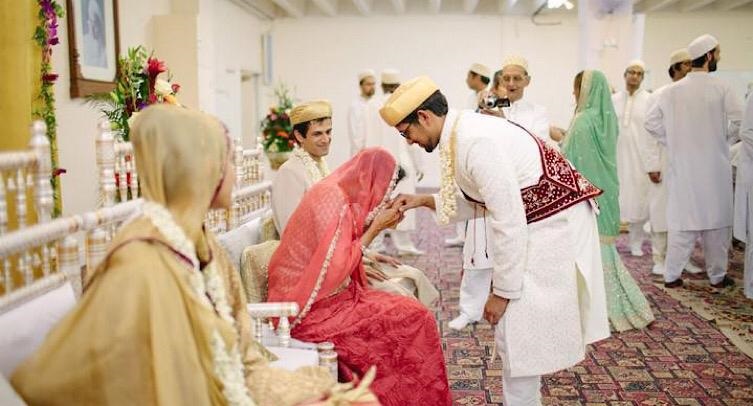
Nikah
This is the first wedding ritual performed by a Maulvi. The men sit round the groom and therefore the women sit round the bride. The bride’s father is that the Wali of the bride. The groom’s family offers her Mehr to hunt her consent. The groom’s family presents the bride with Mehr which may be a generally pre-decided amount of money to hunt her consent for marrying the groom. The Maulvi starts the Nikah proceeding by first saying a prayer from the Muslim holy book named Quraan. Next, he asks the bride if she is consenting to marry the groom by accepting the Mehr . This is where he asks the bride the phrase ‘Qubool Hain?’ three times in a row. The bride has got to reply by saying “Qubool Hain” all 3 times . Then the Maulvi goes on to the groom and repeats the procedure. This ritual is known as Ijab-e-Qubool. The Ijab-e-Qubool is followed by a signing of the Nikahnama or marriage contract. The Nikahnama outlines all possible duties and rites of both the bride and thus the groom as authorized by the Quran. At least two observers from all sides got to bear witness to signing by both the groom and therefore the bride. The Maulvi then recites paragraphs from the Holy Quran which are equivalent to marriage vows. In the end, the elders give blessing to the new bride and groom.
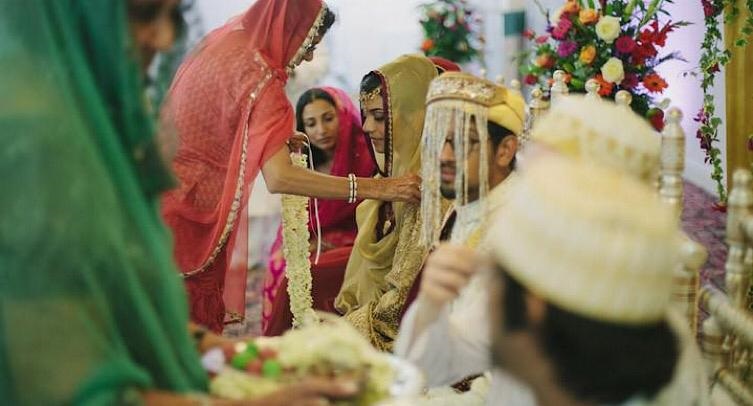
Arsi Musharaf
The bride and groom finally look at each other that too, through a mirror kept in between them where they can see the reflection of their spouses.
Post-wedding rituals
Rukhsat
The bride waves goodbye to her family and when the bride arrives at her new home, she is received with a warm welcome by her mother in law. The Holy Quran is placed on the bride’s head to symbolise her duties as a wife as a gesture of welcome.
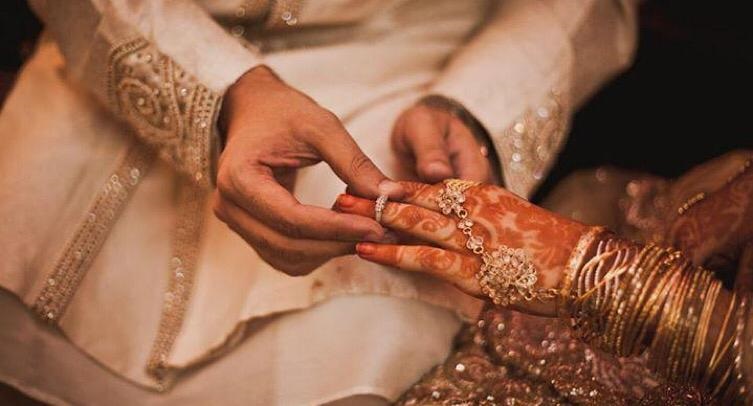
Walimah
This is the general public declaration that the wedding is completed . It is the reception party for the bride and groom are treated royally where the bride is introduced to the members of the groom’s extended family, relatives, and friends.
Chauthi
On the fourth day of the wedding, the bride and groom visit the bride’s family. There are a lavish lunch and a lot of gifts for the bride and the groom from the bride’s family. This marks the top of all formal Muslim wedding rituals.
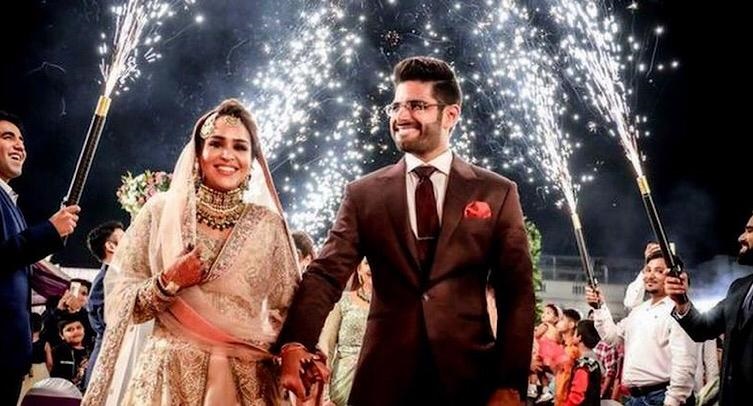
#ShaadiBag #indianwedding #muslimwedding #indianrituals #muslimrituals #indiatradition #muslimtradition #traditionalwedding #shaadibagevent #weddingday #beautifuldulhan #handsomedulha #wedding #weddingrituals #groom #bride #beautifulwedding #muslimi #nikaha #chauthi #postweddingrituals #muslimpostweddingrituals #walimah #muslimbride #muslimgroom #sanchaq #welcoming #mangni
Author
Khushi Masarani
Published on : 12-Dec-2020 | By Admin
Recent Reviews
0.00 / 5
Marriage in Islam is known as a spiritual obligation, a contract between the couple and Allah. Whether you're planning a Muslim wedding or attending your first Muslim wedding, it is vital to know historic and cultural Muslim wedding traditions. Islam is one among the prominent religions within the world. Wedding is an integral part of Islamic culture and is mandated by the Holy book of Islam named quaran as one of the primary duties of a Muslim. Muslim Wedding traditions vary greatly supported countries and regions, but at its heart, the ‘Nikah’ ceremony remains an equivalent . Let’s take a glance at the varied rituals of a Muslim Wedding.Marriage in Islam is known as a spiritual obligation, a contract between the couple and Allah. Whether you're planning a Muslim wedding or attending your first Muslim wedding, it is vital to know historic and cultural Muslim wedding traditions. Islam is one among the prominent religions within the world. Wedding is an integral part of Islamic culture and is mandated by the Holy book of Islam named quaran as one of the primary duties of a Muslim. Muslim Wedding traditions vary greatly supported countries and regions, but at its heart, the ‘Nikah’ ceremony remains an equivalent . Let’s take a glance at the varied rituals of a Muslim Wedding.Marriage in Islam is known as a spiritual obligation, a contract between the couple and Allah. Whether you're planning a Muslim wedding or attending your first Muslim wedding, it is vital to know historic and cultural Muslim wedding traditions. Islam is one among the prominent religions within the world. Wedding is an integral part of Islamic culture and is mandated by the Holy book of Islam named quaran as one of the primary duties of a Muslim. Muslim Wedding traditions vary greatly supported countries and regions, but at its heart, the ‘Nikah’ ceremony remains an equivalent . Let’s take a glance at the varied rituals of a Muslim Wedding.

There are pre-marriage rituals, marriage rituals, and post-marriage rituals at every wedding. Indian weddings are always elaborate. Here are the rituals that Islamic weddings follow.
Pre-Wedding Rituals
Ishtikhara
This is the foremost important ritual during a Nikah. The religious heads of the Muslim community come together to pray to Allah and is an official announcement of the marriage.
Imam-Zamin
In this ritual, the groom’s mother visits the bride’s home. She brings gifts and sweets and is wrapped in a silk scarf and she ties around the wrist of the bride, marking her welcome to the family.
Mangni
Mangni is an engagement where relatives come together to witness the ring ceremony. Both families shower each other with gifts. This is the public declaration of the wedding of the bride and groom.
Manjha
Manjha is coequal to the Haldi ceremony. It takes place two days before the wedding. The bride and groom wear yellow clothing in their respective homes and a paste of turmeric and sandalwood in rosewater is applied on face, hands, legs. They are not alleged to leave their respective homes until the wedding day.
Mehendi
Mehendi may be a vital ritual during a Muslim wedding. The women of the bride’s family and female friends gather together. Mehendi is applied on the bride’s hands and feet with beautiful henna designs. The groom’s initials are hidden within the design and he has got to find it on the marriage night.
Sanchaq
During this pre-wedding ritual, members of the groom’s family visit the bride’s place with gifts and the bridal outfit to be worn at the time of the Nikah are also sent. Accompanying the outfit, matching jewellery and other accessories also are sent.
Wedding rituals
Baraat
The most exciting event of the marriage day is that the entry of the baraat. A beautifully decorated car is usually sent by the bride’s family to bring the groom. A member of the bride’s family goes to the groom’s place and type of escorts him on the thanks to the marriage venue. The relatives of the groom follow this car and therefore the whole wedding heading towards the marriage venue.
Welcome
The bride’s family receives the groom at the wedding venue. He is warmly welcomed and is served with a cool drink that he has in the company of the bride’s brother. They spray ittar or rosewater on the groom and relatives to create a beautiful path.

Nikah
This is the first wedding ritual performed by a Maulvi. The men sit round the groom and therefore the women sit round the bride. The bride’s father is that the Wali of the bride. The groom’s family offers her Mehr to hunt her consent. The groom’s family presents the bride with Mehr which may be a generally pre-decided amount of money to hunt her consent for marrying the groom. The Maulvi starts the Nikah proceeding by first saying a prayer from the Muslim holy book named Quraan. Next, he asks the bride if she is consenting to marry the groom by accepting the Mehr . This is where he asks the bride the phrase ‘Qubool Hain?’ three times in a row. The bride has got to reply by saying “Qubool Hain” all 3 times . Then the Maulvi goes on to the groom and repeats the procedure. This ritual is known as Ijab-e-Qubool. The Ijab-e-Qubool is followed by a signing of the Nikahnama or marriage contract. The Nikahnama outlines all possible duties and rites of both the bride and thus the groom as authorized by the Quran. At least two observers from all sides got to bear witness to signing by both the groom and therefore the bride. The Maulvi then recites paragraphs from the Holy Quran which are equivalent to marriage vows. In the end, the elders give blessing to the new bride and groom.

Arsi Musharaf
The bride and groom finally look at each other that too, through a mirror kept in between them where they can see the reflection of their spouses.
Post-wedding rituals
Rukhsat
The bride waves goodbye to her family and when the bride arrives at her new home, she is received with a warm welcome by her mother in law. The Holy Quran is placed on the bride’s head to symbolise her duties as a wife as a gesture of welcome.

Walimah
This is the general public declaration that the wedding is completed . It is the reception party for the bride and groom are treated royally where the bride is introduced to the members of the groom’s extended family, relatives, and friends.
Chauthi
On the fourth day of the wedding, the bride and groom visit the bride’s family. There are a lavish lunch and a lot of gifts for the bride and the groom from the bride’s family. This marks the top of all formal Muslim wedding rituals.

#ShaadiBag #indianwedding #muslimwedding #indianrituals #muslimrituals #indiatradition #muslimtradition #traditionalwedding #shaadibagevent #weddingday #beautifuldulhan #handsomedulha #wedding #weddingrituals #groom #bride #beautifulwedding #muslimi #nikaha #chauthi #postweddingrituals #muslimpostweddingrituals #walimah #muslimbride #muslimgroom #sanchaq #welcoming #mangni
Author
Khushi Masarani